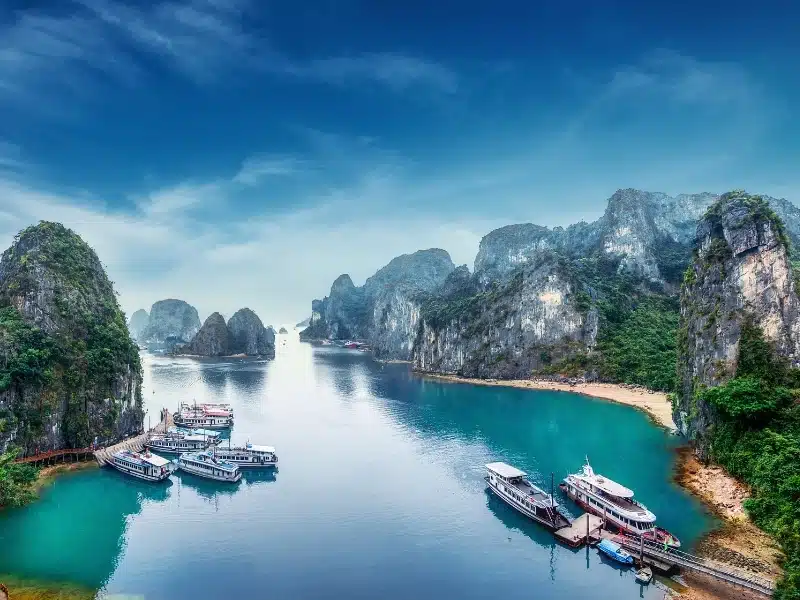So, you have a glorious 2 weeks in Vietnam to plan. Lucky you! This is the perfect amount of time to see the country from top to bottom. You’ll be able to spend at least a few days in each location, while also indulging in some of the more unique attractions the country has to offer.
During your 2-week Vietnam itinerary, you can take a moment and lounge on the beaches of Nha Trang, take the scenic route to Hue, or even get really crazy and travel across the country by motorcycle or train.
But don’t get too comfortable. A foolproof itinerary is still your best option to ensure that you see and do as much as possible, getting the most comprehensive experience from your visit. Here is a two-week itinerary for Vietnam that will have you eating the best food, seeing the best locations, and trying the most unique experiences you could imagine. Pack your bags and let’s go!
Tips for Planning Your Itinerary
- All of the cities in Vietnam have 2 seasons: wet and dry. It is very important to choose the time of your holiday carefully to avoid running into the infamous monsoon season along the coast or freezing cold temperatures in the highlands. See our guide to choosing the best time.
- Mix up your dining experiences. Vietnamese food is world-class and its street food scene is one of the most memorable things you will experience. But you have a little more time on your hands so you can afford to try some upscale restaurants too. Vietnam’s low cost of living also makes this the best time to try experiences that would be otherwise unaffordable.
- Vietnamese cities are, to say the least, hectic. Try and mix up a city stay with something in nature to avoid getting fatigued or overwhelmed with all the sights and sounds.
- I always prefer touring Vietnam from South to North, starting with a blend of chaos and rural beauty in Ho Chi Minh City and making my way up to the more refined destinations in the north, ending with the epic beauty of Ha Long Bay.
- You will take a lot of overnight trains and buses. This will help you maximize your travel time and see more locations in between the big cities.
Day 1-2: Ho Chi Minh City

As you step onto the lively streets of District 1, you’ll find yourself surrounded by the sound of honking horns, street vendors, and the inviting aroma of street food.
Your first stop should be the Saigon Notre-Dame Basilica and right next door, you’ll discover the Central Post Office, a beautifully preserved colonial-era building where history comes alive.

In the afternoon, make your way to the thought-provoking War Remnants Museum. This moving museum offers an honest and raw look at the Vietnam War, providing a deep insight into the country’s tragic past.
As evening falls, head to Bui Vien Walking Street, a lively hub of activity that comes alive with colorful lights, street performers, and a wonderful selection of street food stalls. It’s the perfect place to sample some of Vietnam’s famous dishes and experience the city’s vibrant nightlife.
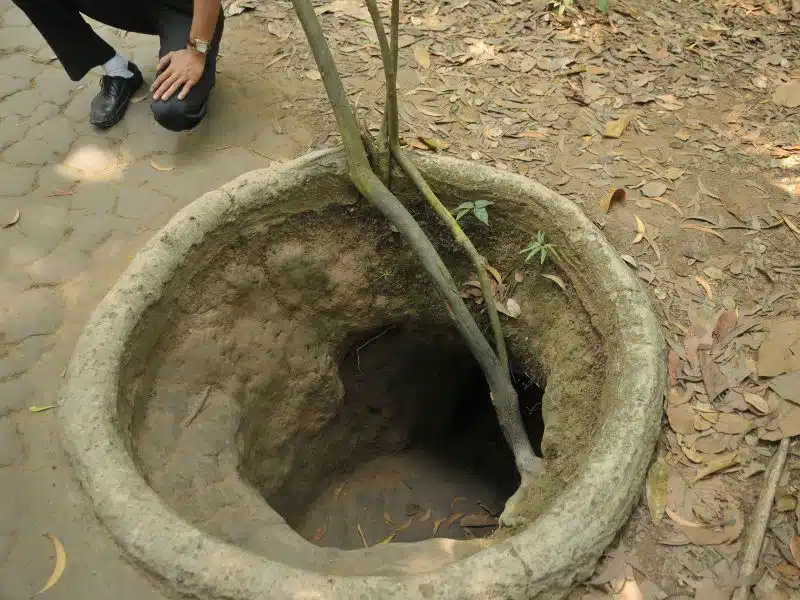
Your second day in Saigon is a journey through history and a glimpse into the tranquil beauty of the Mekong Delta.
In the morning, embark on a visit to the Cu Chi Tunnels, a complex underground network that played an important role during the Vietnam War.

Here, you’ll have the opportunity to crawl through narrow tunnels, see hidden trapdoors, and gain a profound appreciation for the resilience of the Vietnamese people. Just know that this is not for people with a fear of small spaces!
Combine this with a Mekong Delta visit. You’ll have the chance to cruise along the delta’s labyrinthine canals, visit local villages, and experience the unique way of life along the riverbanks.
See our recommended things to do in Ho Chi Minh for more ideas.
Day 3-4: Nha Trang
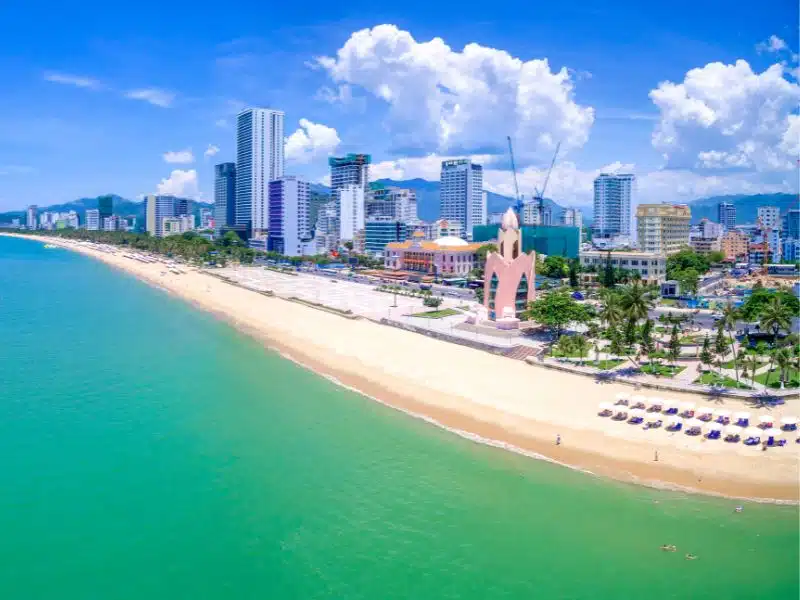
From the bustling streets of Saigon, it’s time to head to the coastal paradise of Nha Trang. To reach this seaside haven, you can opt for an overnight sleeper bus that offers a unique glimpse into Vietnamese road travel. The journey takes around 10-12 hours, but the destination promises sun-soaked beaches and azure waters.
Your first day here is dedicated to relaxation. Simply kick back on Nha Trang Beach, let the warm sand caress your toes, and listen to the gentle sound of the waves. This is your time to unwind and let the coastal serenity wash over you.
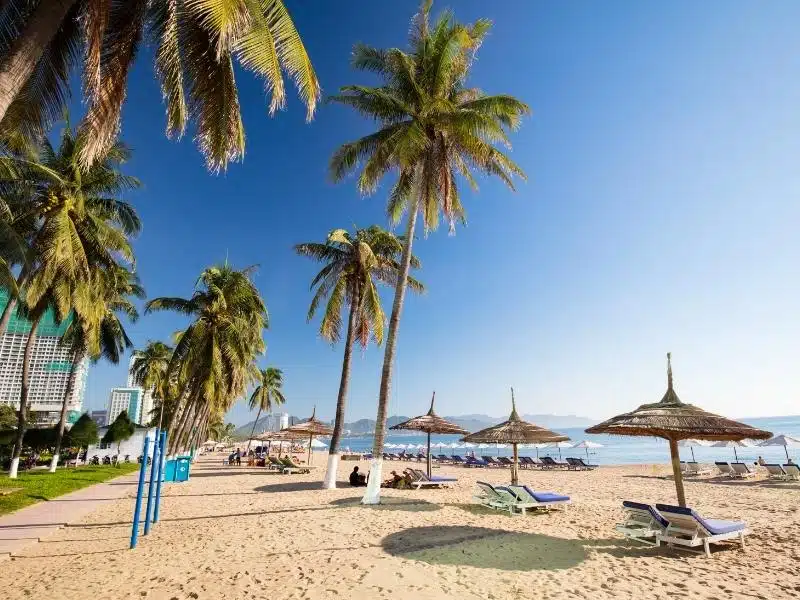
Nha Trang is not just about its beautiful beaches; it’s also a gateway to an archipelago of stunning islands and you can also set out on an island-hopping adventure. You can expect lots of laughs and a few surprises on a snorkeling & party boat tour like this. Don’t worry, it’s not as “crazy” as it sounds, despite the name, and we actually had a lot of fun on it!
If that’s not your jam, though, do something a little more serious like scuba diving into the crystal-clear waters of the South China Sea. There you’ll encounter vibrant coral reefs teeming with marine life. Swim alongside colorful fish, and if you’re lucky, you might even spot a sea turtle or two.
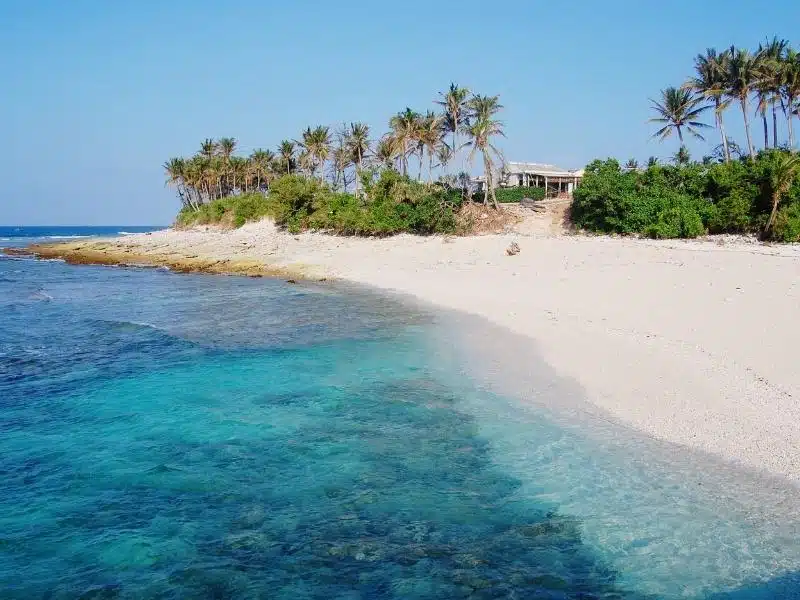
As you island-hop, you’ll discover secluded coves, pristine beaches, and opportunities for water sports like jet-skiing and parasailing.
In the evening, return to Nha Trang, where you can relish a delicious seafood feast at one of the many oceanfront restaurants. Savor the flavors of the sea as you watch the sun dip below the horizon.
Day 5-6: Hoi An

Leaving the coastal bliss of Nha Trang behind, you’ll travel overnight by bus to the charming town of Hoi An, a journey that takes approximately 12-14 hours. But fret not, for Hoi An promises a wealth of cultural charm and natural beauty.
Start your day by renting a bicycle or joining a bike and bite tour. This will be your vessel to explore the Hoi An’s atmospheric lanes and picturesque countryside around it. As you pedal through emerald-green rice paddies, you’ll feel nothing but calm. You can even cycle to An Bang Beach, one of my favorite spots seaside spots in Vietnam.

In the evening, Hoi An’s magical transformation begins. Lanterns illuminate the town, casting a warm, romantic glow over its streets. Don’t miss the chance to enjoy a meal in the heart of the Old Town, where you can savor the flavors of Vietnamese cuisine in an enchanting setting.
On your second day, you can begin your exploration at the iconic Japanese Covered Bridge and continue strolling through the town’s ancient streets, where you’ll encounter preserved shophouses, art galleries, and tailor shops.

As you wander through the charming alleyways, you’ll come across the vibrant Hoi An Market. Here, you can haggle for souvenirs, sample street food delights, and watch as local vendors ply their trade. Be sure to try a bowl of Cao Lau, a regional specialty that blends thick rice noodles with succulent slices of pork and fragrant herbs.
Your day in Hoi An can also include visits to historic temples, such as the Cantonese Assembly Hall and the Fujian Assembly Hall. Both offer a glimpse into the town’s multicultural past.
Day 7: Hue
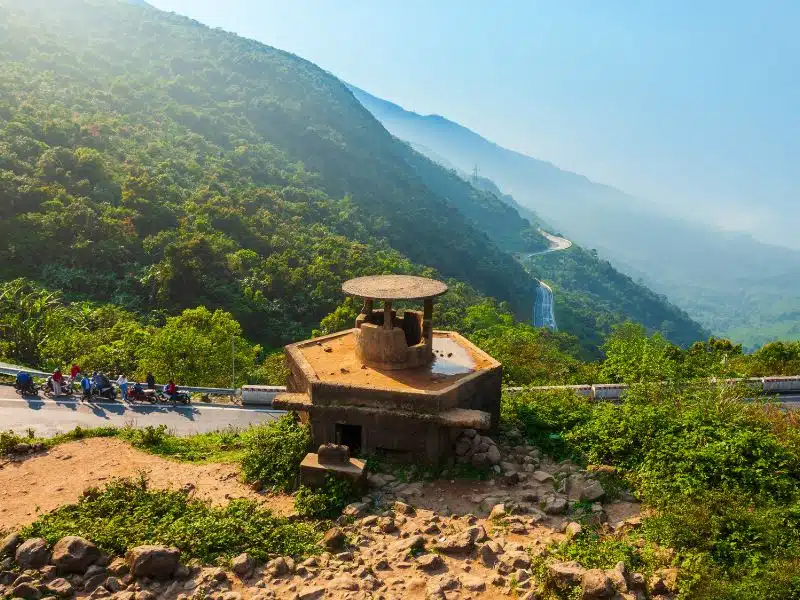
Leaving Hoi An behind, your next destination is the imperial city of Hue. To get there, try this shared transfer from Da Nang (the city next to Hoi An) to Hue. Or, for something more adventurous, hire a motorbike and drive there yourself.
The route between these two cities is nothing short of spectacular, taking you over the famous Hai Van Pass. This winding mountain road offers breathtaking views of the coastline and the lush greenery of the Truong Son Mountains. It’s a journey that’s as much about the scenery as it is about the destination.

Upon arriving in Hue, you’ll have the afternoon to explore the city’s historical treasures. The Hue Imperial City, a vast complex of palaces, temples, walls, and gates, is a UNESCO World Heritage Site that offers a glimpse into Vietnam’s royal past. Wander through its grand courtyards and intricate architecture as you step back in time.
As evening descends, consider a leisurely walk along the Perfume River, where you can take in the serene ambiance of this historic city.
Day 8-9: Phong Nha

From Hue, your journey continues to the breathtaking region of Phong Nha. The most convenient way to reach Phong Nha is by train, and the journey takes approximately 4-6 hours.
Phong Nha is a haven for nature enthusiasts and adventure seekers. It’s home to the mesmerizing Phong Nha-Ke Bang National Park, known for its stunning limestone karst landscapes and a network of spectacular caves.
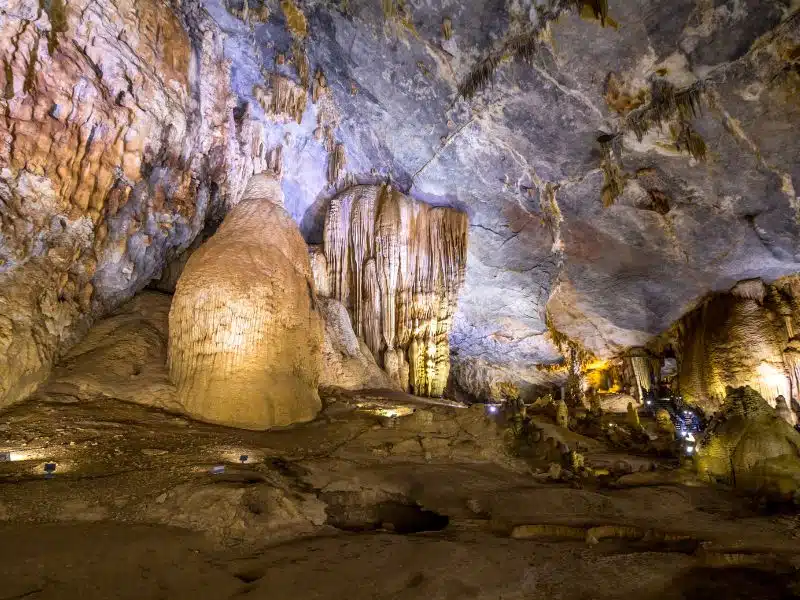
You won’t have time to visit the largest caves that the region is known for but consider a visit to Paradise Cave. This is a jaw-dropping underground marvel filled with intricate stalactites and stalagmites. The cave lives up to its name, providing an otherworldly experience. Join a Paradise Cave day tour to make the best use of your time.
You can also embark on hikes through lush jungles, explore more of the park’s caves, or take on the thrill of zip-lining and other adventure sports. By this point, you will be deep in the heart of Vietnam, and you’ll come to appreciate the country’s astounding natural beauty and the sense of adventure that lies around every corner.
Day 10-11: Hanoi
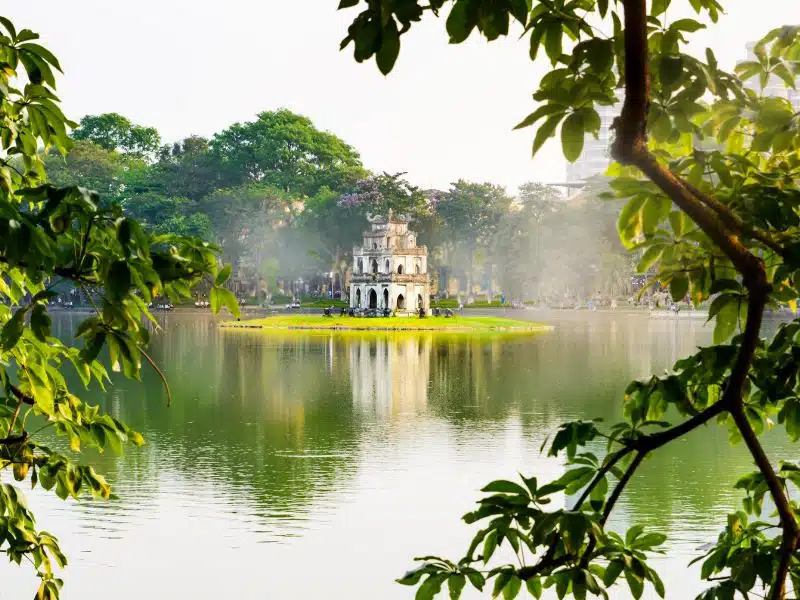
Leaving the natural wonders of Phong Nha behind, it’s time to make your way to the capital city of Hanoi. Depending on your preferences, you can choose between an overnight bus or a train journey to reach Hanoi.
In Hanoi, your adventure gets back into culture mode as you delve into the heart of the country’s colonial history. Start your exploration at Hoan Kiem Lake, a tranquil oasis in the midst of the city, where you can observe locals practicing tai chi in the morning mist.

As you wander through the Old Quarter, you’ll discover a world of hidden gems. Each street is dedicated to a particular trade, and the lively markets and artisan shops are a testament to the city’s vibrant culture. Don’t forget to visit the Temple of Literature, a historic Confucian temple that celebrates the pursuit of knowledge.
On your second day in Hanoi, you’ll have the opportunity to explore some of the city’s iconic landmarks. Begin with a visit to the Ho Chi Minh Mausoleum, an imposing structure that houses the embalmed body of Vietnam’s revered leader. Nearby, you can explore the stilt house where Ho Chi Minh lived and worked.
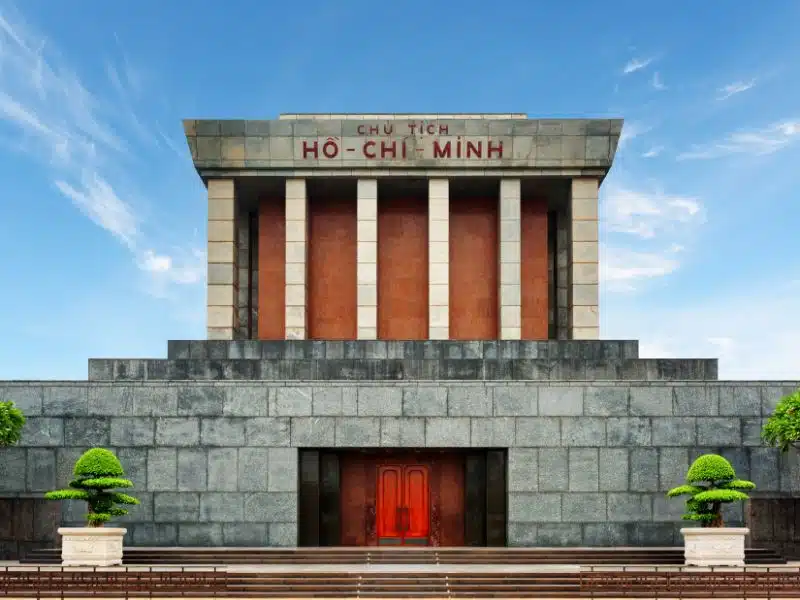
Continue your exploration with a visit to the Ho Chi Minh Museum, which offers insights into the life and legacy of the nation’s founding father. Nearby, the Presidential Palace, a colonial-era building set within beautifully landscaped gardens, is a sight to behold.
In the evening, indulge in the flavors of Hanoi’s street food. Sample dishes like pho, bun cha, and banh mi from local vendors and street stalls. Hanoi is a paradise for food lovers, and every corner offers a new culinary delight.
Day 12: Ninh Binh
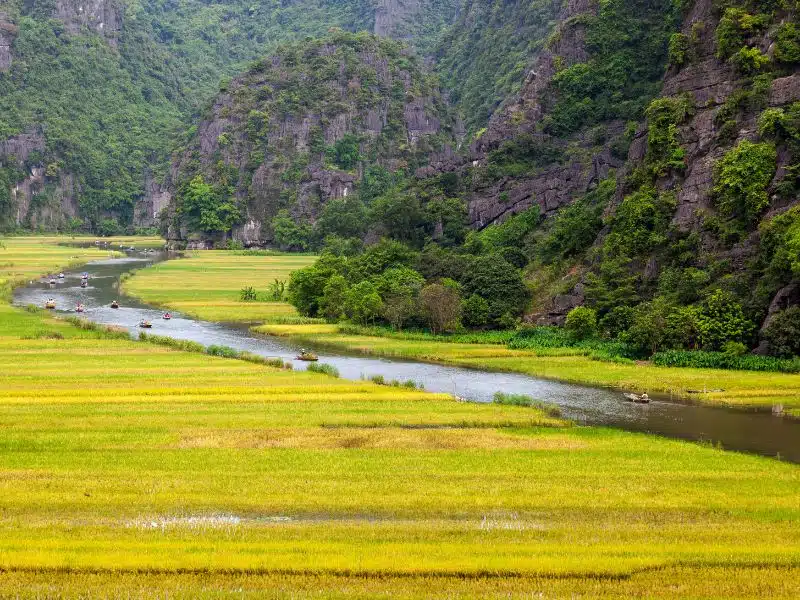
From Hanoi, embark on a day trip to the picturesque province of Ninh Binh. Often referred to as “Halong Bay on land,” Ninh Binh is known for its breathtaking landscapes of limestone karsts, lush rice paddies, and serene rivers.
Your day in Ninh Binh may include a visit to the Trang An Grottoes, a UNESCO World Heritage site that boasts an intricate network of caves and grottoes. Alternatively, you can visit Tam Coc, another natural gem of Ninh Binh. Join a popular day tour like this one or this one to experience the region.
Day 13-14: Ha Long Bay

Your 2-week Vietnam adventure concludes with a grand finale in the stunning Ha Long Bay.
On the first day of your Ha Long Bay adventure, you’ll set sail on an overnight boat tour, which we highly recommend. As you cruise through the calm waters, you’ll be surrounded by the breathtaking scenery of limestone karsts rising from the sea.
During the cruise, you can explore the bay’s hidden caves, venture through arches and tunnels, and discover secret lagoons. Kayaking and swimming opportunities are plenty, allowing you to immerse yourself in the tranquil waters of the bay.

As the day progresses, your boat will anchor in a secluded spot, where you can enjoy a delicious seafood feast on deck while the sun sets over the horizon. The evening is yours to relax, gaze at the starry sky, and savor the peaceful ambiance of Ha Long Bay.
On your second day in Ha Long Bay, you’ll continue your cruise, venturing deeper into this natural wonder. As you navigate through the maze of karsts and islets, you’ll come across more hidden caves and grottoes, each with its own unique charm.

Ha Long Bay offers countless opportunities for adventure and relaxation. Whether you choose to hike to the top of one of the karsts for panoramic views, engage in water sports, or simply bask in the tranquil beauty of the bay, you’ll find that every moment in Ha Long Bay is a moment to treasure.
As your cruise comes to an end, you’ll return to the mainland with memories of an unforgettable journey through Vietnam’s diverse landscapes, cultures, and experiences.
On your way home, treat yourself to a private transfer to Noi Bai International Airport – you deserve it – and bid Vietnam farewell!
Tips for Trip Success
Book Your Flight
Find an inexpensive flight by using Kayak, a favorite of ours because it regularly returns less expensive flight options from a variety of airlines.
Book Your Hotel or Special Accommodation
We are big fans of Booking.com. We like their review system and photos. If we want to see more reviews and additional booking options, we go to Expedia.
You Need Travel Insurance!
Good travel insurance means having total peace of mind. Travel insurance protects you when your medical insurance often will not and better than what you get from your credit card. It will provide comprehensive coverage should you need medical treatment or return to the United States, compensation for trip interruption, baggage loss, and other situations.Find the Perfect Insurance Plan for Your Trip
